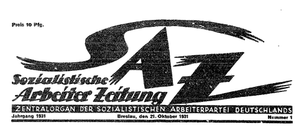Sozialistische Arbeiter-Zeitung ('Socialist Workers Newspaper', abbreviated SAZ) was a daily newspaper published in Germany between 1931 and 1933.[1][2] SAZ was the central organ of the Socialist Workers Party of Germany (SAPD).[2]
 Header of SAZ, October 21, 1931 issue | |
| Type | Daily |
|---|---|
| Editor-in-chief | Max Richard Kleineibst (1931–1932), Walter Fabian (1932) |
| Founded | October 21, 1931 |
| Political alignment | Socialism |
| Language | German language |
| Ceased publication | 1933 |
| Headquarters | Breslau, Berlin |
| OCLC number | 730049418 |
Foundation edit
The first issue of SAZ was published on October 21, 1931.[2] The decision to launch a daily newspaper for the party had been taken at the founding conference of SAPD.[3] The newspaper initially published from Breslau (present-day Wrocław).[2] During this period it consisted only of 4 pages, and despite the label 'central organ' it was effectively a local Breslau publication of low quality. It carried the by-line 'Daily Newspaper of the Socialist Workers Party of Germany'.[4] Max Richard Kleineibst was the founding editor-in-chief of SAZ.[5][6] Kleineibst had previously been the editor of the Social Democratic organ in Löbau, Volkszeitung für die Oberlausitz.[4]
Move to Berlin edit
On November 1, 1931, the newspaper was moved to Berlin.[2][4][7] During this period the newspaper was published daily (except for Mondays) and contained at least 8 pages.[4] Apart from SAZ SAPD produced a number of a weekly newspapers, Die Fackel ('The Torch', later renamed Sozialistische Wochenzeitung, 'Socialist Weekly' and Kampfsignal, 'Signal of Struggle'), a theoretical magazine Klassenkampf ('Class Struggle') and the weekly Das Volksrecht ('The People's Right').[1][8]
Five-day ban edit
On June 25, 1932, a five-day ban on SAZ was issued, for having 'insulted' the President of the Reich.[9]
Shift to Breslau edit
Moreover, in late June 1932, following a conflict inside the party, SAZ moved back to Breslau with a new, more leftist, editorial team.[7][10] Kleineibst and Dora Fabian were fired from the editorial team, due to 'right-wing deviation'.[11] Walter Fabian was named as the new editor-in-chief of SAZ.[12] Kleineibst would be named foreign editor of SAZ.[5]
Editors edit
Editors of SAZ (in different periods) also included Roland Beutner, Herbert Duckstein, August Enderle, Karl Frank, Paul Frölich, Lehmann, Rodominski, Will Schaber, Heinrich Ströbel and Klaus Zweiling.[4] The young Herbert Frahm (later known as Willy Brandt) wrote articles in SAZ (including sharp criticisms of SPD).[13]
References edit
- ^ a b Cliff, Tony. The Darker the Night the Brighter the Star 1927–1940. London [u.a.]: Bookmarks, 1993. p. 143
- ^ a b c d e Rister, Herbert. Schlesische Periodica und Serien: ein Beitrag zu einem Verzeichnis deutscher, polnischer, tschechischer und wendischer (sorbischer) Adreßbücher, Almanache, Berichte, Jahrbücher, Kalender, Schriftenreihen, Schulschriften, Zeitschriften und Zeitungen über Schlesien und seine Grenzgebiete. Wiesbaden: Harrassowitz, 1975. p. 1023
- ^ Brinson, Charmian. The Strange Case of Dora Fabian and Mathilde Wurm: A Study of German Political Exiles in London During the 1930s. Berne: P. Lang, 1997. p. 118
- ^ a b c d e Drechsler, Hanno. Die Sozialistische Arbeiterpartei Deutschlands (SAPD); ein Beitrag zur Geschichte der deutschen Arbeiterbewegung am Ende der Weimarer Republik. Meisenheim am Glan: A. Hain, 1965. p. 171
- ^ a b Strauss, Herbert A., Werner Röder, Belinda Rosenblatt, Hannah Caplan, Sybille Claus, and Beatrix Schmidt. Biographisches Handbuch Der Deutschsprachigen Emigration Nach 1933 = International Biographical Dictionary of Central European Emigrés 1933–1945. München: Saur, 1980. pp. 369-370
- ^ Osterroth, Franz, and Dieter Schuster. Chronik der deutschen Sozialdemokratie, Vol 1. Berlin: Dietz, 2005. p. 370
- ^ a b Kerbs, Diethart. Berlin 1932: das letzte Jahr der ersten deutschen Republik : Politik, Symbole, Medien. Berlin: Ed. Hentrich, 1992. p. 60
- ^ Neumann, Sigmund. Die Parteien der Weimarer Republik. Stuttgart: Kohlhammer, 1968. p. 120
- ^ Osterroth, Franz, and Dieter Schuster. Chronik der deutschen Sozialdemokratie, Vol 1. Berlin: Dietz, 2005. p. 388
- ^ Gerhardt, Volker. Anfänge der DDR-Philosophie: Ansprüche, Ohnmacht, Scheitern. Berlin: Links, 2001. p. 367
- ^ Koszyk, Kurt. Zwischen Kaiserreich und Diktatur; die sozialdemokratische Presse von 1914 bis 1933. Heidelberg: Quelle & Meyer, 1958. p. 249
- ^ Donat, Helmut, and Karl Holl. Die Friedensbewegung: organisierter Pazifismus in Deutschland, Österreich und in der Schweiz. Düsseldorf: Econ Taschenbuch Verlag, 1983. p. 106
- ^ Koch, Peter, and Klaus Körner. Willy Brandt: eine politische Biographie. Berlin: Ullstein, 1988. p. 64